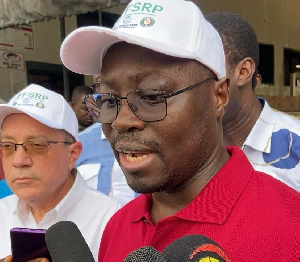IS GHANA’S HIV/AIDS SITUATION REALLY NEAR STABILIZATION? - A QUESTION TO PROFESSOR SAKYI AWUKU AMOA
I was struck by this article not due to its source only but the way it was presented and the impression it left on me and other people concerned. On February 12 this year, the Ghana News Agency carried an article entitled “AIDS boss lauds partners in stabilization of the pandemic.”
The Director-General of the Ghana AIDS Commission, Professor Sakyi Awuku Amoa said “the contribution from the public and private sector, civil society and development partners had helped in achieving a near stabilization of the HIV/AIDS pandemic in the country.” According to the Director-General a lot of work had been done by these groups but because most of the works were not documented and published due to lack of funds, the public seemed not to know exactly what was happening. He was also quoted as saying "I tell you with the exception of a few bad nuts, the rest are doing very well in shaping the minds of people in the grassroots.”
The Ghana AIDS Commission was established in the year 2000 to serve as a clearing house for all HIV/AIDS issues in the country. Over the years, it has developed programs and projects to address the HIV/AIDS situation. Some of which include providing up-to-data information on the disease, conducting research and guidelines for dealing with the menace. A giant step taken by the commission was streamlining the way resources available are allocated to ensure equity and reduce duplication of services by Non-Governmental Organizations. This was done through the creation of the Ghana AIDS Response Fund (GARFUND) and Multi-Sectoral AIDS Response Program (MSHARP). Under theses programs, resources are allocated to local NGO’s focused on HIV/AIDS with the various districts of the country.
Even though I see this as a great invention to curb duplication of services by local CBOs/NGOs, I worry about the level of supervision which has led to misapplication of funds and the creation of mushroom CBOs/NGOs in order to access “AIDS money.” The level of transparency in the application, vetting and funding in my opinion is lacking. I say this because there are some CBOs/NGOs that receive such funds but do not have offices or their offices always closed. A typical example is Manya Krobo - the bedrock of all HIV/AIDS cases in Ghana. I personally conducted by research study during my undergraduate studies in the premier University of Ghana in that district. There are at least seventy CBOs/NGOs in that district. It is not uncommon to find CBOs/NGOs offices always closed in areas such as Odumase, Agormanya, Somanya, Nuaso, and surrounding areas. These organizations have been given money from the GAC which mostly come from donor funding, grants and the tax payers’ cedis. I believe these are the organizations Professor Awuku Amoa referred to as “bad nuts.” How can we weed them out?
During the launch of World AIDS day 2007 in the Western region, Mrs Olivia Opoku Adoma, Western Regional Monitoring and Evaluation officer on HIV/AIDS, said the misappropriation of funds by some non-governmental and community based organizations was affecting the program to curb the spread of the virus. "Some CBOs/NGOs do not have the personnel with the technical know how to effectively carry out the activities planned for their areas of intervention," Mrs Adoma added. In that same article, she said “under the GARFUND activities, many NGOs/CBOs were granted funds for education and sensitization but many of them failed to adhere strictly to the guidelines. What measures are in place to check such unscrupulous organizations? Two weeks ago, a report was published on the Teacher-Agent of Dissemination and Change (TAD) program. Professor John Anarfi, who conducted the situation analysis of the publication, said the study conducted in November and December 2007 identified HIV/AIDS interventions in the sector, provided strategic information that would facilitate more targeted response and also identified key areas of collaboration among stakeholders.
The publication said in spite of the appreciable effort committed to advocacy and resource mobilization by the National Program Secretariat, coordination of other players outside the Ministry such as participating NGOs, communities and the District Assemblies seemed very minimal. The publication also noted that despite the high levels of awareness about the disease and reported attempt to avoid being infected by the youth who were studied, loopholes still existed in the knowledge of the youth about pertinent facts on HIV transmission. It recommended further education of the youth on the prevention and stigma reduction particularly, promoting lifestyle changes, undertaking effective educational materials development and dissemination. In conclusion, I urge the Ghana AIDS commission to implement the guidelines for dealing with CBOs/NGOs that fail to meet project targets. The Director-General should present both sides of the HIV/AIDS picture and not just the good side. This is because research has shown that knowledge of HIV/AIDS in Ghana is around 90 percent but LESS than 7 percent of Ghanaians know their HIV status. How then can Professor Sakyi Awuku, instead of encouraging people to get tested so that they can receive timely ARV treatment preaching the gospel of stabilization. I am pretty sure Ghanaian like me will not be worried if the national prevalence rate increases with a greater increase in the number of people who know their status. Professor Director-General, please paint the picture as it is because Ghanaians know you are doing your job. You may still keep your position if prevalent rates reach astronomical proportions. Just tell the TRUTH because “TRUTH STANDS” – the motto of great Commonwealth hall (vandals) of the University of Ghana.
Writer: Ali, Ibrahim Anchong. Graduate Student and Research Assistant, University of Washington, USA. Email: boxzybrown@yahoo.com
Opinions of Sunday, 1 March 2009
Columnist: Ali, Ibrahim Anchong














